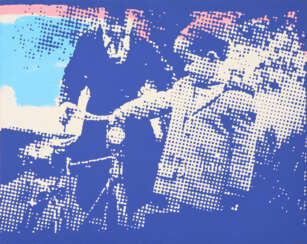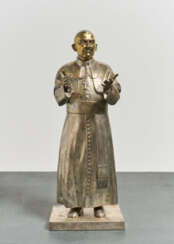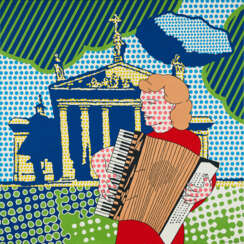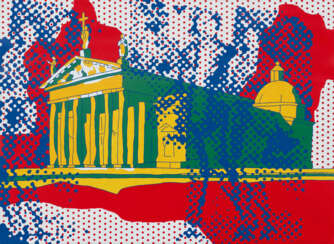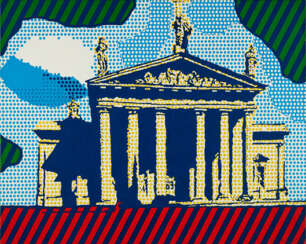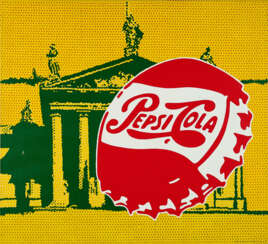kestutis grigaliunas (1957)
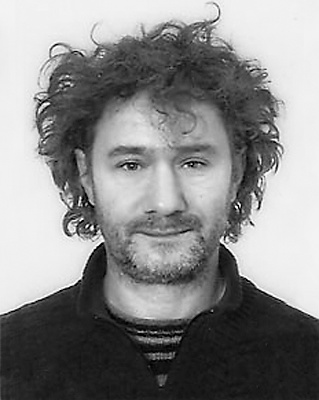
Kęstutis Grigaliūnas - Lithuanian graphic artist, art teacher. 1988-1989 created linen carvings, wood carvings, screen prints, etchings, illustrated books. Since 1990 one of the first Lithuanian graphic designers to use the color screen printing technique. Made a cut out of cardboard and plywood. It is characterized by a pronounced graphic beginning - lines, signs, ornaments, figurative and abstract motifs are used. Since 1998 creates more complex plastic graphic works and cut-outs, they feature postmodernism features, pop art, Fluxus elements, decorative, eclectic images. A playful mood, irony, and various intellectual references to the images of Lithuania and other cultures and civilizations prevail.
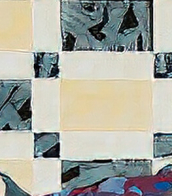

Kęstutis Grigaliūnas - Lithuanian graphic artist, art teacher. 1988-1989 created linen carvings, wood carvings, screen prints, etchings, illustrated books. Since 1990 one of the first Lithuanian graphic designers to use the color screen printing technique. Made a cut out of cardboard and plywood. It is characterized by a pronounced graphic beginning - lines, signs, ornaments, figurative and abstract motifs are used. Since 1998 creates more complex plastic graphic works and cut-outs, they feature postmodernism features, pop art, Fluxus elements, decorative, eclectic images. A playful mood, irony, and various intellectual references to the images of Lithuania and other cultures and civilizations prevail.


Kęstutis Grigaliūnas - Lithuanian graphic artist, art teacher. 1988-1989 created linen carvings, wood carvings, screen prints, etchings, illustrated books. Since 1990 one of the first Lithuanian graphic designers to use the color screen printing technique. Made a cut out of cardboard and plywood. It is characterized by a pronounced graphic beginning - lines, signs, ornaments, figurative and abstract motifs are used. Since 1998 creates more complex plastic graphic works and cut-outs, they feature postmodernism features, pop art, Fluxus elements, decorative, eclectic images. A playful mood, irony, and various intellectual references to the images of Lithuania and other cultures and civilizations prevail.
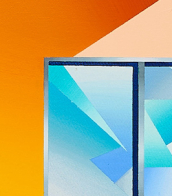

Kęstutis Grigaliūnas - Lithuanian graphic artist, art teacher. 1988-1989 created linen carvings, wood carvings, screen prints, etchings, illustrated books. Since 1990 one of the first Lithuanian graphic designers to use the color screen printing technique. Made a cut out of cardboard and plywood. It is characterized by a pronounced graphic beginning - lines, signs, ornaments, figurative and abstract motifs are used. Since 1998 creates more complex plastic graphic works and cut-outs, they feature postmodernism features, pop art, Fluxus elements, decorative, eclectic images. A playful mood, irony, and various intellectual references to the images of Lithuania and other cultures and civilizations prevail.
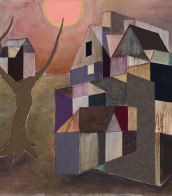

Kęstutis Grigaliūnas - Lithuanian graphic artist, art teacher. 1988-1989 created linen carvings, wood carvings, screen prints, etchings, illustrated books. Since 1990 one of the first Lithuanian graphic designers to use the color screen printing technique. Made a cut out of cardboard and plywood. It is characterized by a pronounced graphic beginning - lines, signs, ornaments, figurative and abstract motifs are used. Since 1998 creates more complex plastic graphic works and cut-outs, they feature postmodernism features, pop art, Fluxus elements, decorative, eclectic images. A playful mood, irony, and various intellectual references to the images of Lithuania and other cultures and civilizations prevail.


Kęstutis Grigaliūnas - Lithuanian graphic artist, art teacher. 1988-1989 created linen carvings, wood carvings, screen prints, etchings, illustrated books. Since 1990 one of the first Lithuanian graphic designers to use the color screen printing technique. Made a cut out of cardboard and plywood. It is characterized by a pronounced graphic beginning - lines, signs, ornaments, figurative and abstract motifs are used. Since 1998 creates more complex plastic graphic works and cut-outs, they feature postmodernism features, pop art, Fluxus elements, decorative, eclectic images. A playful mood, irony, and various intellectual references to the images of Lithuania and other cultures and civilizations prevail.

